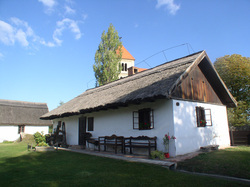
He spoke to a septuagenarian peasant who lived with his wife in a small two-room peasant house near the Danube in the central part of Hungary. The couple had built the house shortly after they were married more than fifty years before and had raised four healthy children in the 500 square foot place. The floods had damaged much of the outer walls and had caused some unspecified damage within the house as well. When the reporter asked the man if he had any flood insurance, the old man just chuckled.
"Insurance?" he said softly. "What do I need that for?"
"How will you pay for the damage without insurance?" the concerned journalist asked.
"I built this house with my two hands using materials from the land that surrounds us. I will repair this house in the same way. It will take some time and a little work, but with the help of my sons and some of my neighbors, it should be good as new in a month or two."
The journalist, who was either concerned or skeptical or perhaps both, vowed that he would return to the village in month's time to check up on the old man's progress. He returned to find the house completely repaired just as the old man had promised.



 RSS Feed
RSS Feed

